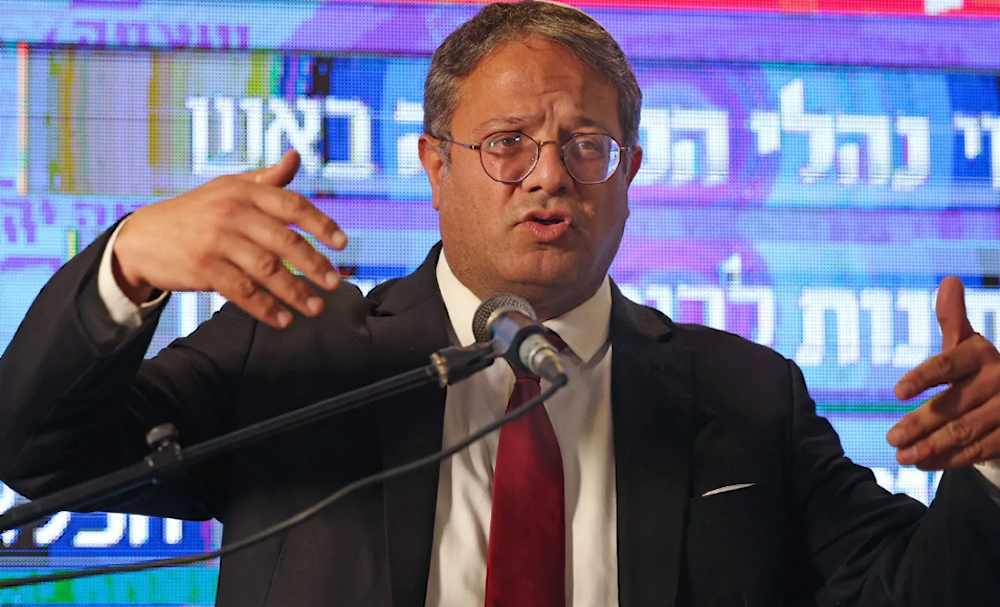Israeli court annuls law that gave Ben-Gvir influence over probes
Ben-Gvir blasted the Israeli High Court, stating it ignored voters' will, while Israeli "Justice" Minister Yariv Levin, a longtime critic of the judiciary, called for legislation to increase government authority over the courts.
-

Israeli Police Minister Itamar Ben-Gvir speaks in occupied al-Quds on October 30, 2022. (AFP)
The Israeli High Court recently overturned a major provision of a contentious 2022 law that gave Israeli Police Minister Itamar Ben-Gvir more authority over police investigations, citing dangers to "democratic rights."
However, the court affirmed other sections of the statute that granted the minister additional responsibility over general police policy, as well as safeguards to protect police independence and restrict the minister's influence on practical police activities. This ruling contributes to the developing constitutional tensions between the court and the Israeli government, as there have been several disagreements over Ben-Gvir's attempts to influence police operations, particularly those involving anti-government protests.
In March 2023, the court restricted Ben-Gvir from intervening with police decisions, and in January 2024, it expressly prevented him from participating in protest policing.
"Justice" Minister Yariv Levin, a longtime critic of the judiciary, called for legislation to increase government authority over the courts. A five-to-four majority decided to strike down the clause regarding authority over police investigations policy, with former acting Supreme Court president Uzi Vogelman writing the majority opinion.
The decision to preserve the law's terms allowing the minister more comprehensive authority was unanimous among the nine justices who presided over the case.
Ben-Gvir condemns court decision
The modified Police Ordinance statute, pushed by Ben-Gvir in December 2022, gave the minister substantial powers, including the ability to "delineate the police's policies and the general principles of its operation," including priorities and work plans as well as the capability to "delineate general principles in the field of investigations, including determining fundamental priorities."
The Association for Civil Rights in "Israel" (ACRI) and the Movement for Quality Government warned that the proposal would allow the minister to intervene in sensitive police decisions, thus jeopardizing vital constitutional rights like the right to demonstrate and express oneself.
Vogelman, writing for the majority, expressed concern about the encroachment of political considerations in police work, particularly in criminal investigations, arguing that opening a criminal investigation and using harmful governmental power for unrelated or unprofessional reasons could undermine the investigation's legitimacy.
Vogelman criticized the law's clauses granting the minister greater authority over police policy, stating that they favored the minister's powers over police independence. However, he clarified that the court found the law still required police to act independently, professionally, and in a stately manner, and any policy contradicting these principles could be challenged in court.
Noa Sattath, executive director of ACRI, stated that the verdict will "help protect the fundamental right to oppose government policy" as well as the freedom to protest it.
Ben Gvir condemned the decision, claiming that the court had "once again turned itself into the sovereign, and is trampling the will of the voter."
'Israel's' attorney general says Ben-Gvir interfered in police ops
In November, Israeli Attorney General Gali Baharav-Miara requested Israeli occupation Prime Minister Benjamin Netanyahu to reconsider the position of Police Minister Itamar Ben-Gvir owing to political intervention in police operations, Israeli media reported.
This, according to Baharav-Miara, "undermines the assurance that the police will act in loyalty to the public rather than the politicians."
"The combination of the alleged improper interventions in police operations and the dependency of police officers on the minister for their promotions undermines the assurance that the police will act in loyalty to the public rather than the politicians."
The legal pressures on Ben-Gvir stem from accusations that he overstepped his authority by intervening in police operations, particularly regarding protests opposing Netanyahu's controversial judicial overhaul.
In March, the High Court of Justice ordered Ben-Gvir to stop issuing operational directives to the police about managing demonstrations and further restricted his influence over police actions in January 2024.
Despite this, the attorney general and the "State Attorney's Office" contend that Ben-Gvir continued to exert undue pressure on police forces, violating court orders and raising constitutional concerns.

 4 Min Read
4 Min Read










